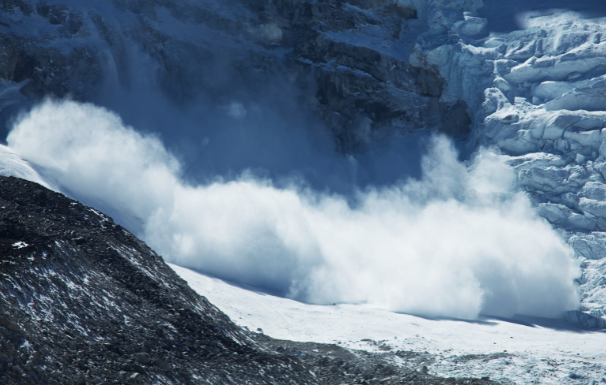
Demographic winter, and the collapse of fertility will lead to a world with fewer and fewer children. Why is that a problem? Society is like a man who weighed 260 pounds and then suddenly lost 80 pounds. Besides being healthier, the now skinny man will also need a whole new wardrobe. Unlike the now skinny man, societies are neither healthier nor able to get a new wardrobe when they shrink

Demographic winter, and the collapse of fertility will lead to a world with fewer and fewer children. Why is that a problem? Society is like a man who weighed 260 pounds and then suddenly lost 80 pounds. Besides being healthier, the now skinny man will also need a whole new wardrobe. Unlike the now skinny man, societies are neither healthier nor able to get a new wardrobe when they shrink
Society will still have the industrial backbone we built over the last few centuries, but we won’t have the people to run it.
The same highway system, railroads, power grid, industrial complex, and farming land will still be there. What we won’t have are the people to grow the crops, make the products, drive the trucks, repair the roads, staff the hospitals, keep the streets safe, and guard the nation.
The people whose needs this system was built to service, and the people whom the system needs to function, will no longer be there.

Our health care expenditures and tax burden will increase exponentially. Obviously, a 75-year-old needs a lot more care than a 35-year-old. A declining number of workers will be called on to provide pensions and health care for a growing number of elderly. The burden on the young will inevitably increase, and increase massively. As it does, we would do well to remember, people will eventually reject the burdens placed on them, and they will revolt.
Since 1989 Japan’s over-65 population doubled – from 11.6% of the total population to 21.2%.
This isn’t some phantasm conjured up by social conservatives to frighten people, either. We can already see the effects of population decline in one dramatic example. Known as the Land of the Rising Sun, now the sun is quietly setting on Japan. Its total fertility rate is 1.4, roughly 33% below replacement. Between 1989 and today, its over-65 population doubled – from 11.6% of the total population to 21.2%.
Between 2015 and 2020, Japan’s total population declined by 800,000.
Japan’s projected to decline by another 25% by mid-point in this century. So many Japanese are dying alone at home, because they have no one to care for them — no children or grandchildren, that an industry has sprung up devoted to disposing of their remains.
The Japanese even have a name for the phenomenon. They call it Kodokushi or “lonely death.”
It can be difficult imagine the realities of a world with no children, but there is a fantastic work of fiction that attempts that very thing, “The Children of Men,” by P.D. James. What is it like to live in a world without children – a world in which humanity has no future? This novel by British author P.D. James gives us a glimpse of such a world. It’s set in Britain 25 years after the last child was born on earth, due to a worldwide plague of infertility.


The last birth occurred in 1995, and in the space of a generation humanity has lost its future. Workers who are practically slaves are imported from the Third World and sent home when they’re no longer useful. There are life-sized dolls to satisfy maternal instincts. Suicide of the elderly is encouraged (so few are available to care for them).
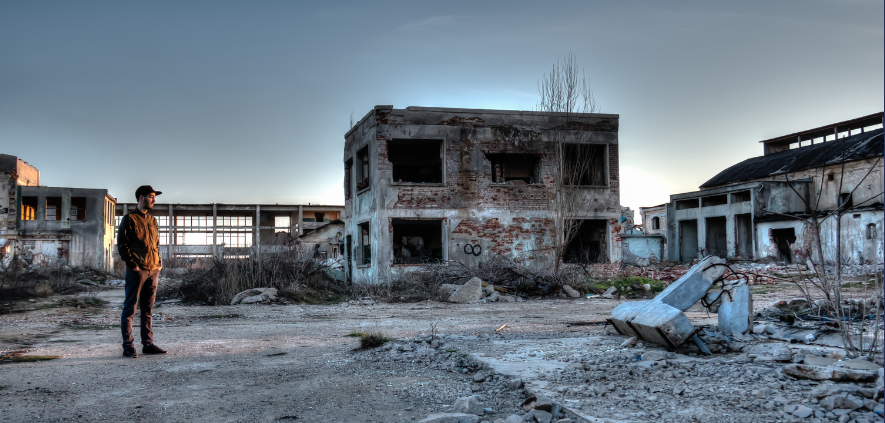
Everyone is forced to live with the knowledge that the world of man will end in a matter of years “The Children of Men” is both tragic and hopeful. It’s also a speeded-up version of where Demographic Winter is taking us, as falling fertility becomes population decline which leads to population free-fall.
James’ novel helps to puncture the myth of overpopulation by showing us the opposite, which is fast becoming a reality.
I have set before you this day life and death, blessings and curses. Now choose life so that you and your children may live.”
Deuteronomy 30:19
We’re fighting for Judeo-Christian civilization, which started with the Bible. The words of the Bible ring loudly. The Prophet Hosea saidd, “They sow the wind and reap the whirlwind. The stalk has no head, it will produce no flour.” And Deuteronomy 30:19: “I have set before you this day life and death, blessings and curses. Now choose life so that you and your children may live.” You choose life and you get life, including children. You choose death and you get death – including childless societies doomed to extinction.
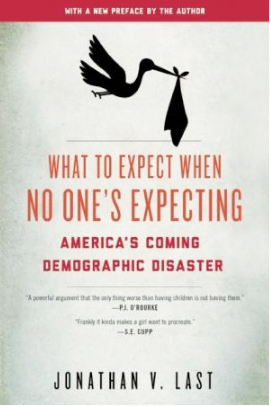
Jonathan V. Last (2013)
Last says modern life creates the conditions for declining fertility. Although he demonstrates what led us to below replacement fertility, just a generation or two removed from the baby-boom years, Last doesn’t have much hope for the future. A decade ago, when our fertility rate was still above replacement, he saw us going the way of Europe and Japan.
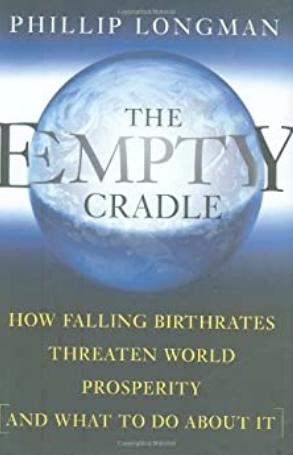
Phillip Longman (2004)
One of the first books on what’s come to be called Demographic Winter, and one of the best. Longman says responsible parents are investing in the next generation of workers and taxpayers, while society as a whole -- including the childless -- reaps the benefits. (“We have placed a very high tax on responsible parents and other nurturers of human capital and used the proceeds to support the consumption of the population as a whole.”) Among other solutions, he recommends a tax code that recognizes the contributions of families.
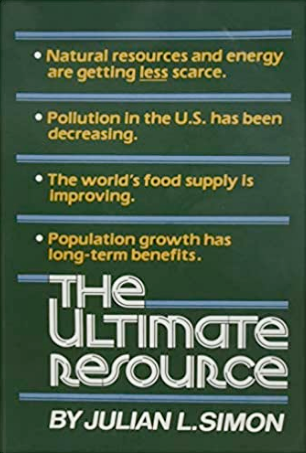
Julian Simon (1996)
While there’s no direct discussion of fertility, futurist Simon shows how people are the one essential resource. Simon had a famous bet with neo-Malthusian Paul Ehrlich on whether a rising population would lead to the depletion of natural resources. Naturally, Ehrlich said it would. Simon said more people would lead to new discoveries of oil and mineral deposits, and new ways to use what we have more efficiently, and better methods of farming. Simon won the bet.
The Ruth Institute is a 501c3 non-profit organization.
630 W. Prien Lake Road, Suite B #246, Lake Charles, LA 70601
| Cookie | Duration | Description |
|---|---|---|
| cookielawinfo-checkbox-analytics | 11 months | This cookie is set by GDPR Cookie Consent plugin. The cookie is used to store the user consent for the cookies in the category "Analytics". |
| cookielawinfo-checkbox-functional | 11 months | The cookie is set by GDPR cookie consent to record the user consent for the cookies in the category "Functional". |
| cookielawinfo-checkbox-necessary | 11 months | This cookie is set by GDPR Cookie Consent plugin. The cookies is used to store the user consent for the cookies in the category "Necessary". |
| cookielawinfo-checkbox-others | 11 months | This cookie is set by GDPR Cookie Consent plugin. The cookie is used to store the user consent for the cookies in the category "Other. |
| cookielawinfo-checkbox-performance | 11 months | This cookie is set by GDPR Cookie Consent plugin. The cookie is used to store the user consent for the cookies in the category "Performance". |
| viewed_cookie_policy | 11 months | The cookie is set by the GDPR Cookie Consent plugin and is used to store whether or not user has consented to the use of cookies. It does not store any personal data. |